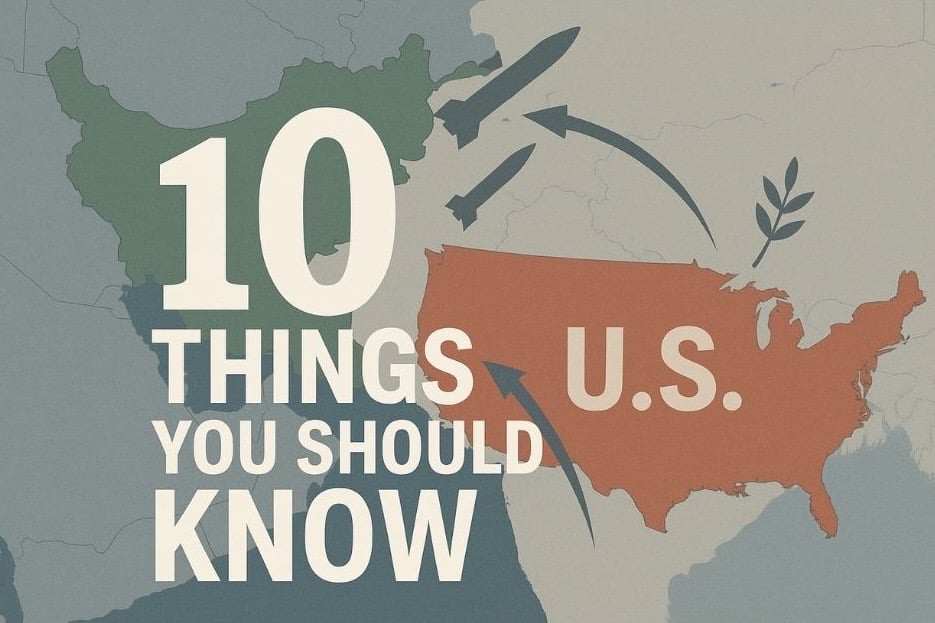
In part one of this post, I noted 6 things about the US involvement in the war with Iran. I began with three reasons from Scripture why this is not good. Then I added 3 responses to “What about?”. These “what about” are common sentiments among evangelicals as to why war may be permissible and why war, when it comes to defending Israel, is believed to be a necessity.
In this post, I will add 4 more things you might not know but should know about this God-awful war.
3 Reasons why the US can’t legally go to war with Iran
You might say, “Okay, so maybe the Bible doesn’t warrant such a war, but nations have to do what nations have to do.”
1) International law says that the US is not justified in attacking Iran
The US strikes were not lawful under international law. We might suppose that because this relates to international law, we are not obligated to follow it; however, this is not the case.
For one, the United States was instrumental in drafting the UN Charter.
Second, and more importantly, the US Senate ratified the Charter on July 28, 1945, and it was subsequently signed by the President. Since Article VI of the US Constitution says, “All Treaties made . . . under the Authority of the United States, shall be the supreme Law of the Land,” the Charter has become part of US law.
Although one may not like international law, we must respect it. International law cannot be something that we obey when we want it and disobey when we don’t. If this is the case, then it becomes meaningless. How else can we demand that others respect the law when we choose when to disregard it? (which the US does all the time, but that is for another post)
Also, the UN Charter (Article 2(4)) prohibits the use of force against another state except in cases of self-defense (Article 51) and when authorized by the UN Security Council.
This means that Iran’s acquisition of nuclear weapons would not warrant an attack under international law. There is no way that the US can argue that Iran poses a real and imminent threat to the US simply because it possesses nuclear arms. On the contrary, Iran may say that the US poses a real and imminent threat to them–after all, we have been bombing them, and we provided Saddam Hussein with the chemical weapons that he used against Iran–but we have no argument in reverse.
NB: We are an armed nuclear nation. In fact, we are the only nuclear nation that has ever used a nuclear weapon. The notion that we must assume the responsibility to be the world’s police force, which may make sense to us in the West, does not have any legitimacy in the world’s eyes.
We must also acknowledge that historically, the United States has been the aggressor. We may not perceive this to be the case—which is another sign of the power of US propaganda—but this is how the world views the US.
2) US law says that we are not justified in attacking Iran
The Constitution gives Congress the power to declare war (Article I, Section 8). Constitutional law professor Andrew Napolitano didn’t hold back in his assessment of Trump’s decision to bomb Iran this weekend: “What the President of the United States did was profoundly unconstitutional, absolutely unlawful, was an impeachable offense and was a war crime.”
The President indeed has some ability to respond to immediate threats, but even then, he needs prior approval.
Pete Hegseth stated in a briefing that our attacks were not focused on regime change. Instead, he commented, they were designed to protect our “national interest posed by the Iranian nuclear program.”
But, as Judge Napolitano noted, “Congress can only declare war on a country that poses an immediate and grave military threat to the United States of America. President Trump has started a war with Iran, which poses no threat, let alone immediate or grave whatsoever, to the national security of the United States of America.”
The President may appeal to the War Powers Resolution of 1973. This resolution allows the President to retain limited abilities to respond to an immediate danger without Congressional approval. It requires the President to notify Congress within 48 hours of introducing U.S. forces into a state of hostilities.
Some Christians don’t like this. They want Trump to have the power to declare war.
But such restraints are an essential part of a democracy. Most forms of checks and balances feel like a restraining jacket. At least they do when you are the one being restrained. But what about when you are trying to restrain the other?
You may not be in support of checks and balances now, but what happens when a leader you don’t approve of wants to wage a war you don’t approve of? What are you going to appeal to then?
3) But Israel and the US had to disarm that threat now?
First, the problem here is that Netanyahu has been ringing this bell for the past 30 years. Here are some notable quotes from the Israeli Prime Minister:
Oct 1996, “The deadline for attaining this goal is getting extremely, extremely close.
Sept 2002, “Iran, by the way, is also outpacing Iraq in the development of ballistic missile systems that they hope will reach the eastern seaboard of the United States within 15 years”
Sept 2012, “By next spring, at most, by next summer, at current enrichment rates, they will have finished the medium enrichment and move on to the final stage. From there, it’s only a few months, possibly a few weeks, before they get enough enriched uranium for the first bomb.”
Mar 2015, “The foremost sponsor of global terrorism could be weeks away from having enough enriched uranium for an entire arsenal of nuclear weapons.”
Oct 2015, “That would place a militant Islamic terror regime weeks away from having the fissile material for an entire arsenal of nuclear bombs.”
June 13, 2025, “if not stopped. Iran could produce a nuclear weapon. In a very short time, it could be a year it could be within a few months, less than a year.”
Second, is war the best way to disarm Iran? I suspect that it may well be the opposite. Will not war intensify the Iranian resolve to acquire nuclear weapons as the ultimate deterrent?
But that’s only 9 things (including the 6 from Tuesday’s post)!
Oh yeah, 1 more thing
1) Let’s not forget Gaza and the West Bank!
We must not and cannot allow this war to turn our focus from the suffering of the people of Gaza and the West Bank.
Make sure to subscribe to the Determinetruth newsletter on Patheos to receive email notification every time a new post is uploaded (note: this is not a traditional newsletter; it simply means you will be emailed every time a new blog is posted).
At Determinetruth, we work independently of any church or institution. This allows us to speak more candidly (shall we say “prophetically”). We refuse to put these posts behind a paywall, which hinders the poor from accessing the information. But we can only continue these posts with the support of those of you who can afford to give. So, if you can afford to give $5, $10, $25, or $1 million/month, please do so. You can provide a tax-deductible contribution by following this link. Choose “Rob” in the dropdown menu.Please share this post and let others know about determinetruth.
If you wish to view this blog on your smartphone through the Determinetruth app, download the “tithe.ly church” app and insert “determinetruth” as the name of the church you wish to follow. Once it is loaded, click on the “blog” icon, and it will automatically load.













